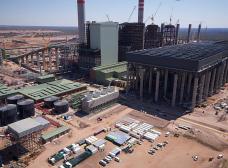Medupi: will there be enough water?
So we will wait a bit longer before Eskom’s Medupi power station just outside Lephalale starts providing much needed electricity to South Africa’s electricity grid.
Will there be more delays and will South Africa have enough electricity to avoid black outs should Medupi continue to fail to meet its deadlines?
These are only some of the concerns raised recently as Eskom announced that the deadline for delivery of first power will now only be in mid 2014.
Others however are more concerned about the effect of Medupi on the environment when it is eventually up and running. Business Day columnist, David Gleason recently asked: “What if, with Medupi’s commissioning, we realise that there is not enough water?” in a column titled: Litlle water for a thirsty Medupi asks. Gleason is one of a multitude of people concerned over the effect of Medupi on an already water scarce environment.
How much water will Medupi need?
According to a scientific paper by James Blignaut, published in the Journal of Energy in Southern Africa in November 2012, once all six units are operational, Medupi will consume 21-billion litres of water a year. Gleason and many others want to know where the water will come from.
Eskom’s General Manager for Water and Environmental Operation, Nandha Go-vender, disagrees with Blignaut stating that Medupi requires a total of 15.4-billion litres per annum, based on the manufacturers’ stated water requirements for the plant being installed.
Six billion per annum is for power production and 9.4-billion per annum is for flue gas desulphurisation.
Where will the water come from?
“The Department of Water Affairs is developing the Crocodile River (West) Water Augmentation Project (MCWAP) in phases to meet the existing and future water requirements in the Lephalale area, including the Medupi power station,” explains Govender.
The first phase of the MCWAP is the construction of a 43km pipeline with a capacity of 30-billion litres per annum from Mokolo Dam at a total project cost of about R2.14bn.
The pipeline is currently under construction and water delivery will commence in June next year and will be capable of supplying Medupi with 10.9-billion litres per annum.
In the interim, water is being supplied through the existing pipeline from Mokolo Dam and is sufficient for Medupi’s commissioning requirements and six-unit operation without flue gas desulphurisation.
What will the effect be on the Mokolo dam?
According to Govender, the Mokolo Dam’s full supply volume is 145-billion litres. “The yield (water that can be sustainably supplied out of the dam on an annual basis) is 44-billion litres per annum, of which 30-billion litres per annum is allocated to Eskom, Exxaro and Lephalale municipality.
Based on the results of the department’s hydrological models, the dam will not fail in the foreseeable future.
Eskom is allocated 14.5-billion litres per annum in terms of its water supply agreement with the department, of which 3.6-billion litres per annum is for Matimba power station and 10.9-billion litres per annum is for Medupi.
The available water in Mokolo Dam and the water allocation to Eskom are sufficient to meet Medupi’s water needs plus 52% of the flue gas desulphurisation requirements.”
Where will the rest of the water come from?
The second phase of MCWAP is being designed to capture large volumes of artificially augmented flows in the Crocodile River (West) to supply and facilitate significant future industrial development and growing population in the Steenbokpan-Lephalale corridor.
Govender explains that the artificial flows in the river occur as a result of water discharged from wastewater treatment plants (referred to by the department as “return flows”) in Johannesburg’s northern sector and also from Tshwane to the upper Crocodile River basin.
The department’s latest reconciliation strategy shows there is sufficient water in the Crocodile River basin to be transferred through the MCWAP phase 2 once implemented to meet the projected water demands, including Medupi’s full water requirement.













0 Comments